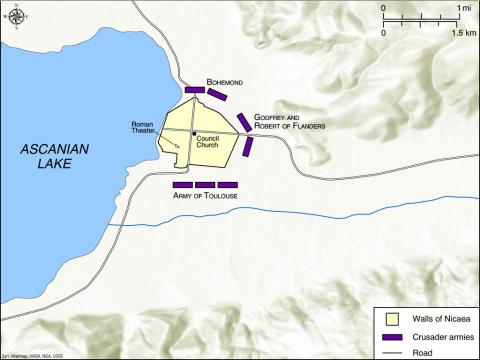The Siege of Nicaea
[2.8.6] Summō autem dīlūculō stābant nāvēs optimē ōrdinātae, per lacum properantēs contrā urbem. Videntēs eās Turcī mīrābantur, ignōrantēs an esset eōrum gēns an imperātōris. Postquam autem cognōvērunt esse gentem imperātōris, timuērunt usque ad mortem, plōrantēs et lāmentantēs; Francīque gaudēbant, et dabant glōriam Deō. Videntēs autem Turcī quod nullātenus ex suīs exercitibus adiūtōrium habēre possent, lēgātiōnem mandāvērunt imperātōrī quia cīvitātem sponte redderent, sī eōs omnimodō abīre permitteret cum mulieribus et fīliīs et omnibus substantiīs suīs. Tunc imperātor, plēnus vānā et inīquā cōgitātiōne, iussit illōs impūnītōs abīre sine ūllō timōre, ac sibi eōs Cōnstantīnopolim cum māgnā fīdūciā addūcī. Quōs studiōsē servābat, ut illōs ad Francōrum nocūmenta et obstācula parātōs habēret.
[2.8.7] Fuimusque in obsidiōne illā per septem hebdomadās et trēs diēs, et multī ex nostrīs illīc recēpērunt martyrium, et laetantēs gaudentēsque reddidērunt fēlīcēs animās Deō; et ex pauperrimā gente multī mortuī sunt famē prō Chrīstī nōmine. Quī in caelum triumphantēs portārunt stolam receptī martyriī, ūnā vōce dīcentēs: “Vindicā, Domine, sanguinem nostrum, quī prō tē effūsus est; quī es benedictus et laudābilis in saecula saeculōrum. Āmēn.”
notes
vocabulary
2.8.6
nullātenus: in no way
reddo reddere reddidī redditum: to hand over, surrender (OLD 11)
omnimodō: in every way
nocumentum –ī , n.: harm (ML) ( = CL noxa –ae, f. )
2.8.7
hebdomas –ados, f.: seven-day period; (ML) week
vindicō (1): to avenge (OLD 6)
triumphō (1): to celebrate a triumph
stola –ae, f.: robe

